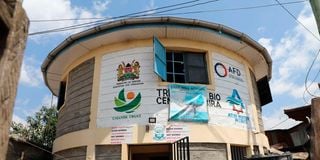Kibra's bio centres turning human waste into clean energy

A bio centre with pit latrines used to collect human waste in Laini Saba, Kibra.
What you need to know:
- Some agents of change are gradually turning human waste into treasure besides cleaning the environment through sanitation-oriented synergy involving locals, the Ministry of Health and other stakeholders.
- The waste is converted into biogas and used as cooking fuel in schools and homes.
Kibra is no stranger to sanitation-related challenges typical of informal settlements.
For many years, the country’s largest informal settlement has been associated with the 'flying toilets' phenomenon. That's when people relieve themselves in polythene bags and hurl the waste outside.
But things are getting better – the slum has been experienced a major sanitation transformation.
Some agents of change are gradually turning human waste into treasure besides cleaning the environment through sanitation-oriented synergy involving locals, the Ministry of Health and other stakeholders.
The waste is converted into biogas and used as cooking fuel in schools and homes. Tree Hill School is one of the nine bio centres – sanitary blocks that use a biodigester system to treat waste and produce biogas – that has been opened in Kibra. It’s supported by Umande Trust civil society group and other partners including the French Development Agency.
During lunch hour, we meet Gladys Njeri at Tree Hill School preparing a meal for pupils using biogas made from their waste.
The reception of this innovation is a milestone since from the onset, members of this community were averse to partake delicacies prepared using this fuel. Later, the meals acted as magnets, attracting pupils to the school, thereby growing enrolment levels.
To increase acceptance and collaboration, Umande conducts awareness campaigns to enlighten the community on the use of biogas.
Mr Junior Masinde, an attendant at one of the bio centres, says he was initially reluctant to cook using the fuel, unsure how the end result would be like. “At first I was worried that the food would smell like human waste, but I have gotten over that and I now enjoy the meals cooked here.
“It’s a triple blessing. We are cleaning the environment, getting clean energy and also earning a living,” he notes.
These centres serve at least 100 visitors daily and those in schools attend to over 150 learners on a typical day.
Benazir Douglas, the managing trustee at Umande, says the transformation of human waste into a treasured commodity has been life-changing.
“We established biogas centres for community members to improve their sanitation levels and create an avenue for income generation. They enjoy proceeds from the sale of biogas and also charge a small fee to members of the public who use these toilets.”
Rose Muthoni, a teacher at Tree Hill School, says visitations to hospitals to treat diseases caused by poor sanitation have reduced. “At first we only had two latrines, which led to overcrowding and made maintaining hygiene a challenge for the children. Parents were scared to bring their children to this school, it was not clean enough,” Ms Muthoni recalls, adding: “Now the learners have access to clean toilets and their food is cooked using biogas from the waste.”
Adjacent to the Tree Hill School, James Kariithi, a grocer, is among the beneficiaries of the bio centre.
“This project has helped deal with open defecation, which creates a bad impression for this area. Do you hear reports of flying toilets in the media anymore,” He poses.
However, access to clean water remains a challenge in Kibra and other slums, hindering the operation of the bio-centres. Some centre administrators have to purchase water from vendors to clean the facilities.
Moreover, scarcity of water eats into the income of those eking out a living from these projects.
Joe Okello, a public health officer in Nairobi, says more ought to be done to ensure everyone has access to clean water and sanitation services.
“Simply digging pit latrines is insufficient. Therefore, to achieve this goal, Kenya must employ innovative approaches and involve the affected communities.” According to the 2019 census, 7.4 per cent of Kenyan households lack access to proper sanitation facilities and this leads to about 10 per cent of the population engaging in open defecation, which is detrimental to sanitation and healthy living.




